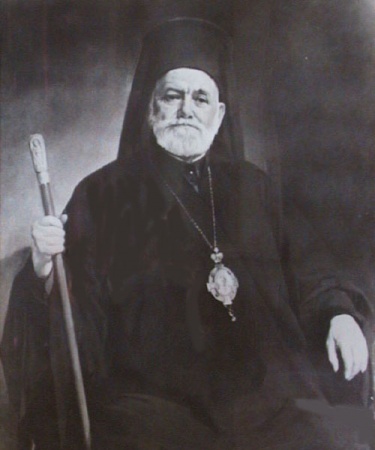Metropolitan Germanos of Thyateira

—by Grigorios Liantas
[216]
The Metropolitan of Thyateira Germanos Strinopoulos 1 was born in 1872 in the village of Delliones in Eastern Thrace (Greece). He studied philosophy and theology at the Theological School of Halki and the Universities of Leipzig, Strasbourg and Lausanne. In 1903 he received a doctorate from the University of Leipzig. He was professor and School Principal of the Theological School of Halki until 1922. In 1912 he was elected Metropolitan of Seleucia, and in 1922, during the tenure of Patriarch Meletius the IV, (Metaxakis), he was elected Metropolitan of Thyateira, based in London.
In 1939 he was one of three fellow candidates at the election of the Patriarch of Alexandria. Metropolitan Thyateira Germanos, apart from teaching in Halki and his tenure at the Metropolis of Thyateira, worked intensively in the field of inter-Orthodox and inter-Christian relations and also as a prolific writer.2
Contribution to the promotion of ecumenical and inter-Christian relations
The contribution of Metropolitan Germanos in the inter-Christian relations has been of great importance. He effectively promoted relationship between Orthodox and Anglicans and Orthodox and Old Catholics in the decade 1920-1930.3
He motivated and embodied the path toward the right direction of the relationship with other Christian Churches and the ecumenical movement, which the Ecumenical Patriarchate followed at the time. The name of the Germanos Strinopoulos is closely related to the history of the ecumenical movement, at least on the part of the Orthodox participation and cooperation. Indeed, he is placed among the pioneers of this movement and among the most senior of the Ecumenist figures.4 He joined the ecumenical movement in 1920, through the faculty club of Halki, acquiring an active role and participation in the drafting of the “Synodical Encyclical Letter of the Church of Constantinople to the Worldwide Churches of Christ (1920),” and he participated in all the global inter-Christian conferences which contributed to the founding of the World Council of Churches (WCC). He has been a member of the Committee of Fourteen, which paved the way for the merging of the movements “Faith and Order” and “Life and Work” into the World Council of Churches.5 During the same period, Germanos actively participated in the Movement as a representative of the Ecumenical Patriarchate and President of the Orthodox delegations.
What is striking, however, is that the Church of Constantinople, which, at the beginning of the century, especially with 1920 Encyclical Letter, played the leading part in the whole affair of Christian Unity, in the World Conferences “Faith and Order” and “Life and Work”, which took place between 1925 and 1937, did not send any offi cial representative, coming directly from the Phanar. In all these conferences, the Ecumenical Patriarchate was represented by officials who ministered in the diaspora, led by the Metropolitan of Thyateira Germanos.6
[217]
Participation in ecumenical meetings and consultations
Participation in ecumenical meetings and consultations Metropolitan Germanos attended the Faith and Order conferences in Geneva (1920), Lausanne (1927) and Edinburgh (1937); the Life and Work conferences in Geneva (1920), Stockholm (1925) and Oxford (1937); the conferences of the World Federation of International Friendship through the Churches in the beginning of the WCC from 1938 onwards and the First General Assembly of the WCC in Amsterdam (1948), where he was elected as one of the six presidents of the Council.7
Theological contribution
In Metropolitan of Thyateira Germanos, the Patriarchate had an excellent spokesman of the ecclesiastical tradition of Phanar, but also the most appropriate interlocutor on ecumenical issues, as he himself was the one who had a leading role in drafting the 1920 Encyclical Letter and was a preeminent expert on the issue of the union of Churches.
Metropolitan of Thyateira Germanos, because of his many pursuits, never issued independent major writings. He left, nevertheless, many valuable treatises, over 100, in journals and collected volumes referring to Anglican society, the ecumenical movement and inter-Christian relations.8
For his contribution and his work he was honored with the title of Doctor of Theology from the universities of Oxford, New York and Athens. The WCC dedicated a private hall in his honor at the ecumenical center of Geneva.9
Conclusions
Metropolitan of Thyateira Germanos,10 a representative of the Ecumenical Patriarchate at the ecumenical meetings and consultations which convened between 1920 and 1938 and resulted in the foundation of the WCC, played a leading role in the Ecumenical Movement. Therefore he is rightly regarded as one of its eminent pioneers. His constant concern was to provide the Orthodox witness to the various phases of the ecumenical developments, as well as to be vigilant that the WCC will be shaped on the spirit and principles expressed by the 1920 Encyclical Letter.
Bibliography
- John Karmiris, The Dogmatic and Symbolic Monuments of the Orthodox Catholic Church, volumes I-II, (Graz, 1968)
- Basilios Stavridis, The Holy Theological School of Halki, (Thessaloniki: Kyriakidis, 1988) (in Greek)
- Basilios Stavridis, Bibliography of the Ecumenical Movement 1960 - 1970 (Athens: 1972) (in Greek)
- Basilios Stavridis – Evagelia Varella History of the Ecumenical Movement, (Patriarchal Foundation for Patristic Studies: Thessaloniki, 1996) (in Greek)
- George Tsetsis, Ecumenical Annals, (Tertios: Katerini, 1987) (in Greek)
- George Tsetsis, The contribution of the Ecumenical Patriarchate in the foundation of the WCC, (Tertios: Katerini, 1988) (in Greek)
Source: Pantelis Kalaitzidis et al., eds., Orthodox Handbook on Ecumenism: Resources for Theological Education (Volos GR: Volos Academy Publications; Geneva: WCC Publications; Oxford: Regnum Books, 2014). Numbers in square brackets [xxx] are the original page numbers.
- 1. George Tsetsis, The contribution of Ecumenical Patriarchate in the foundation of WCC (Katerini: Tertios, 1988), 277-
278 (in Greek). - 2. Vasilios Stavridis, The Holy Theological School of Halki (Kyriakidis: Thessaloniki, 1988), 130 (in Greek).
- 3. Ibid., 131-132.
- 4. Ibid.
- 5. George Tsetsis, The contribution, op. cit. 277-278.
- 6. Ibid.
- 7. Vasilios Stavridis, The Holy Theological School… op. cit., 132.
- 8. Ibid.
- 9. Ibid.
- 10. George Tsetsis, The contribution, op. cit., 195.
